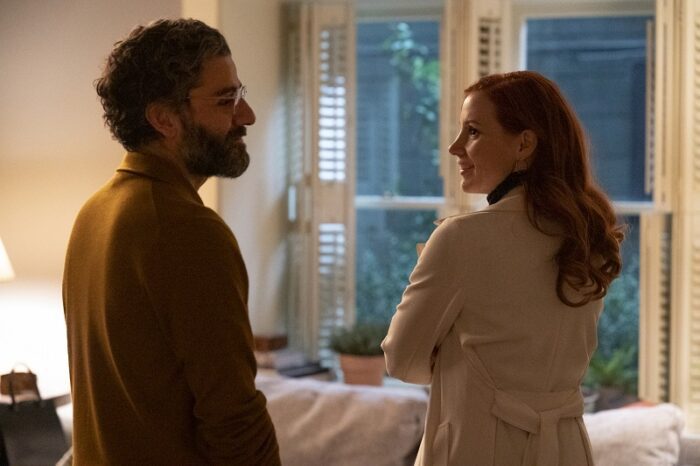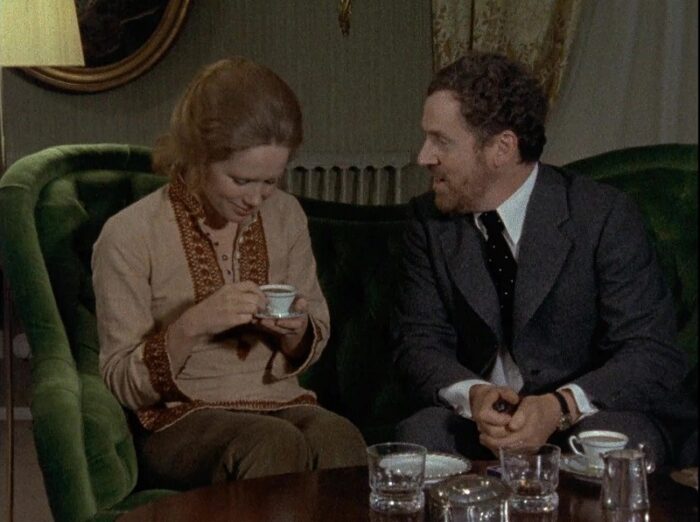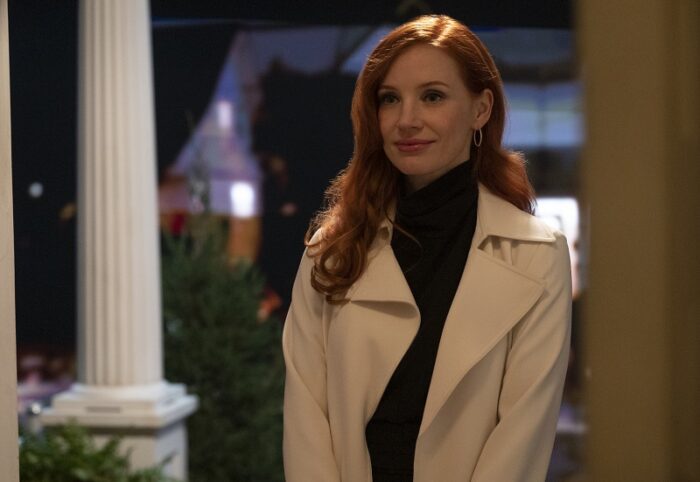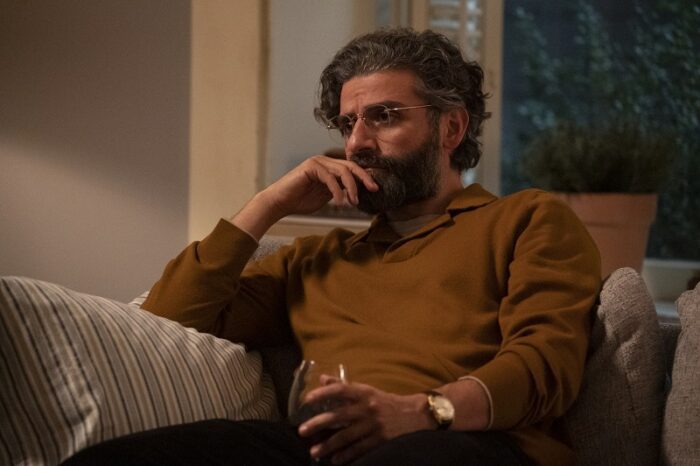The following contains spoilers for Scenes from a Marriage Episode 3, “The Vale of Tears”
The first two episodes of writer-director Hagai Levi’s HBO adaptation of Ingmar Bergman’s classic 1973 television series Scenes from a Marriage have made for a turbulent ride. Episode 1 depicted an unplanned pregnancy and an abortion; Episode 2, an extramarital affair, and a unilateral, if not mutual, decision to end a ten-year marriage. It might be safe to assume that somewhere along the way marrieds Jonathan (Oscar Isaac) and Mira (Jessica Chastain) enjoyed some personal growth, mutual affection, and even domestic bliss. But those aren’t the kinds of “scenes” that make up either the original Bergman or this 2021 update.
By the end of the last episode, the big reveal of Levi’s update was clear: he’d essentially swapped the two characters’ story arcs and key traits. No longer was primary breadwinner husband (Johan, played by Erland Josephson) the adulterer dictating terms to his powerless wife Marianne (Liv Ullmann); in Levi, it’s high-earning tech-exec wife Mira who leaves her primary-caregiver husband Jonathan for a new man and a new life overseas. Reversing the gender roles seemed a necessity, Levi said, for an era when women had gained greater domestic, sexual, and workplace freedoms.

That role-reversal also seems aimed at the kind of course correction adaptations so often attempt. Liv Ullmann’s Marianne was, though a divorce lawyer, a disempowered, obsequious, and by the series’ midpoint, entirely pathetic creature, grabbing and pawing at her husband to keep him from leaving her. Bergman, more generally, was hardly acclaimed as a feminist in his day. Outside and in between his five marriages, he entered into romantic relationships with dozens of mistresses, notably his leading actresses Harriett Andersson, Bibi Andersson, and Ullmann—collaborators, to be sure, but also subordinates. A romantic relationship that begins, as his and Harriett Andersson’s did, with a visit to the director’s office to discuss her career prospects, sounds more than a little untoward in a #MeToo era.
Onscreen, Bergman’s fictional female creations were many and complex. Some of them, to be sure, were, as Peter Bradshaw called them in The Guardian, “tragi-sexual goddesses.” But Bergman’s oeuvre consisted of some 45 feature films over nearly six decades, ranging from domestic melodramas to folkloric adaptations to arthouse experimentalism—as well as the documentary-like longform drama of Scenes from a Marriage. He acknowledged, in Bergman on Bergman, “a ceaseless fascination with the whole race of women […] that has something compulsive about it.” In lesser-known fare like Waiting Women and Brink of Life he charted the lives of women with nuance and compassion. In dozens of his films he created female characters who chafed against their containment by the patriarchy, even if they were rarely able to transcend or escape it. Fickle as he was off set, few filmmakers can boast of having created as many memorable female characters and opportunities for their portrayers as did Bergman.

In his fourth episode of Bergman’s Scenes from a Marriage, “The Vale of Tears,” Johan visits Marianne while Paula is away. He’s thirsty—both for some wine and in contemporary parlance, for sex. His career is on the upswing and he’s been offered a position as department chair. He’s not planning to bring Paula with him; he’s tired of her, he says. He had hoped to seduce, but lapses into pontification, lecturing her about his existential angst. Meanwhile, a series of smaller signs indicate Marianne has begun to move on, rearranging furniture, claiming space for an office—a room, so to speak, of one’s own—and even changing her name in the telephone directory. And she’s begun therapy.
In one of the most moving sequences of the series, Marianne reads from her journal. A slideshow of photos of a younger Ullmann plays as Marianne recounts her youth and adolescence, her journey from innocence to sexuality. Bergman’s characters do not, as a rule, lack candor, but Marianne here seems especially forthcoming. Unfortunately, Johan does not hear: he’s fallen asleep. An opportunity to reconnect is lost. At the end of the evening, she shows Johan a letter she’s received from a remorseful Paula. True to form, Johan rejects Paula’s perspective, and leaves.
As with each of his prior two episodes, Levi preserves each of Bergman’s story beats, though now, of course, the couple’s roles are largely reversed. Here, it is Mira who returns home, her hair now a more brilliant red, blithely critiquing Jonathan’s new interior décor. She’s been offered a promotion and invites Jonathan, now on sabbatical, to accompany her and Ava to London. Hers is a business pitch, but it’s rejected by Jonathan; all he wants is a divorce.

At this point in the series, Chastain’s Mira has become more and more like Bergman’s Johan and as a consequence as nearly insufferable as he. I wanted Bergman’s Marianne to move on; I want Levi’s Mira simply to move out. Is this the goal of her empowerment, to act as entitled and self-serving as a 1970s male like Johan? While Levi’s role-reversal was a decision apparently borne of a need to make Chastain’s character more of her time, to this point it’s simply made her a character who’s abandoned her husband, her child, and her home, and who expects to be embraced and adored upon her return.
In Bergman it was touching to see evidence of Marianne’s therapy, and her journal was composed with a plausible, confessional, diaristic tone. Levi’s Jonathan is an academic, not just a teacher but a scholar, and his “morning pages,” as his therapist calls the assignment, are composed in a distancing, oddly pedantic third-person. “He’d been a victim of some sudden cataclysm,” he soberly intones, reading to Mira, who somehow does not fall asleep but quickly expresses her disinterest in hearing more.

At moments, we can see the affection the two have had for each other, a glimmer that other scenes from this marriage might have been less despairing. Like in Bergman, the two go to bed together, where they cuddle sexlessly before the outside world interrupts. When Jonathan plays Mira a voicemail from a repentant Poli, little Ava (the wickedly cute Sophia Kapera) overhears. I love that in Levi’s update, Ava is a much more constant presence. Though onscreen only for seconds in each episode, she’s nonetheless nearly always there, in conversation or in another room. No matter what Jonathan and Mira say or do, it is little Ava who will be impacted by their choices. (Bergman would famously explore the consequences of estrangement in his 2003 semi-sequel Saraband.)
As Levi’s Episode 3 concludes, the chemistry between Mira and Jonathan is palpable. But it’s like a faulty circuit: it runs in unpredictable fits and starts. A moment of compassion might be shorted by a dismissive insult, or a well-intended word undercut by a hesitation or gesture. Like Josephson and Ullmann decades ago, Chastain and Isaac here are riveting even when their characters are sometimes at their worst. Dressed in her business best, her brilliantine hair framing her opalescent complexion, Chastain can switch between alluring and repulsive. Isaac can make Jonathan a figure of profound sympathy one second, an aggravating ditherer the next, doffing and fondling his wire-rims in the brief moments of hesitation in between.
The two are so convincing as lovers, spouses, and parents in the throes of adultery that it’s hard not to feel some affection for both no matter how harsh their words or actions can be. I’m tempted to think Isaac and Chastain can do anything (perhaps except play convincing X-Men villains). That Chastain can equal Ullmann, one of the cinema’s greatest actors, here and then adroitly mimic the absurdly histrionic Tammy Faye Bakker is astonishing. But here both leads seem entirely in their element, using the intimacy of the close-up, the meaning of small gestures, the nuance of each expression to convey a couple whose romantic past is long gone and future together in jeopardy.
Levi’s Scenes from a Marriage can’t possibly have the kind of cultural impact and legacy Bergman’s had. At most, it can aspire to a technically proficient, handsomely mounted, persuasively acted prestige production seen by a percentage of cable and streaming viewers eager for a Bergman remake, an acting masterclass, or an instruction manual for breaking a marriage with a slow, steady percolation of insults, betrayals, and indignities. Its role reversal, especially in making Chastain’s character the one to drive the narrative, is one borne of necessity but hardly revelatory, and when we next see Mira and Jonathan next week, we’ll see just how they navigate the next scenes in their increasingly fraying marriage.
If Levi continues to hew closely to Bergman’s script, it won’t be pretty.

